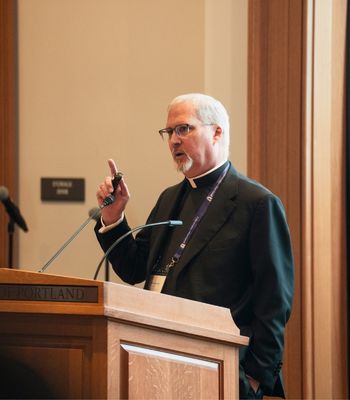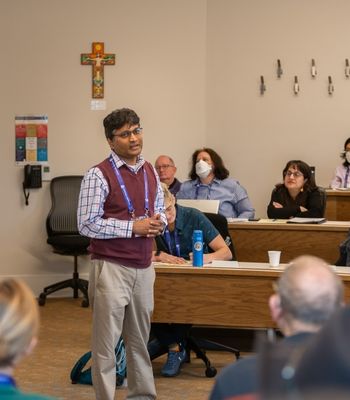College of Arts and Sciences
October 25, 2024
Rev. Philip Larrey, CSC, had just opened his keynote presentation on the perils and promises of artificial intelligence when a point of emphasis gave him pause.
 “This AI update just happened yesterday,” he told his audience, motioning toward a power point slide. Moments later, he placed a “that just dropped four days ago” disclaimer on a “slower, more insightful” version of ChatGPT.
“This AI update just happened yesterday,” he told his audience, motioning toward a power point slide. Moments later, he placed a “that just dropped four days ago” disclaimer on a “slower, more insightful” version of ChatGPT.
Addressing an auditorium full of curious college leaders assembled from around the US on the University of Portland campus, Fr. Larrey stopped several times to concede that his content could hardly keep pace with the fast-moving subject matter.
The Boston College professor and trusted technology advisor to the Vatican set a tone of embracing rapid-fire change—while exercising caution—as he kicked off a UP-hosted national conference involving faculty, administrators and religious affiliates from 19 institutions: Catholic Higher Education and AI: Mission-Based Teaching for the Future of Humanity.
“The scary part is we do not control artificial intelligence,” Fr. Larrey said, citing the danger of ‘rogue AI’ when it wanders past human-engineered guardrails. But he hailed positive AI developments like Magisterium AI, billed as “a helpful guide to the teachings of the Catholic Church.”
“The great promise of AI is benefitting humanity,” Fr. Larrey continued. “Having two Nobel Prize winners this year who are developing AI is an indication of where we’re going. Really smart people are trying to help humanity.”
“We had incredibly rich conversations,” said conference organizer Dr. Valerie Banschbach, reflecting on the Oct. 18-20 gathering, sponsored by stalwart UP supporters Cheryl and Mike Cebula, Becker Capital Management, AAA of Oregon/Idaho, Amazon Web Services/NVIDIA and UP’s National Alumni Board.
Dr. Banschbach, Dean of UP’s College of Arts and Sciences, expressed pride seeing University of Portland faculty co-leading lightning talk discussions, alongside colleagues from schools like University of Notre Dame, Boston College, The Catholic University of America, and Gonzaga University. Dr. Eric Anctil, UP associate professor in the School of Education, served as a session moderator.

“What resonated most with me was the deep focus on the ethical considerations surrounding AI in many facets of life,” Dr. Eric Anctil said. “As we use AI to accomplish a variety of tasks, the potential for unintended consequences is enormous. However, this gathering made me feel hopeful that with thoughtful planning, we can prepare ourselves and our students to navigate this emerging technology responsibly.”
Irina Raicu, Director of the Internet Ethics Program, Markkula Center for Applied Ethics at Santa Clara University, centered her keynote presentation around care ethics. She referenced the benefits of reducing stress levels as student applicants rely on chatbots to help submit applications and identify the best college fits. At the same time, Raicu reported “massive anxiety” among students as they witness how AI is transforming the workplace and the greater world.
“It’s such early days and confusion is a big part of everyone’s anxiety,” Raicu said. “I think as more information comes out, there will be less of a push to integrate generative AI into everything, and we’re going to have a better handle on how it impacts all of us.”
As Dr. Banschbach led University-wide efforts to keep the conference on track, she made time to jot down her key takeaways:
“I learned that faculty around the country are developing a wide-range of outstanding ideas for connecting their teaching about AI ethics with Catholic values,” Dr. Banschbach said. “Here at the University of Portland, we plan to continue to advance Catholic higher education, nationally and in our region, by engaging our peers in the mission-critical topic of artificial intelligence.”
University of Portland
5000 N. Willamette Blvd.,
Portland, Oregon 97203-5798
503.943.8000
This website uses cookies to track information for analytics purposes. You can view the full University of Portland privacy policy for more information.
